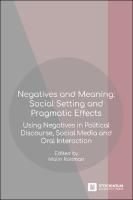Negatives and Meaning: Social Setting and Pragmatic Effects
Using Negatives in Political Discourse, Social Media and Oral Interaction
| dc.contributor.editor | Roitman, Malin | |
| dc.date.accessioned | 2023-05-02T14:56:36Z | |
| dc.date.available | 2023-05-02T14:56:36Z | |
| dc.date.issued | 2023 | |
| dc.identifier.uri | https://library.oapen.org/handle/20.500.12657/62901 | |
| dc.description.abstract | This volume deals with the pragmatic dimension of negations and is oriented towards empirical studies of negatives’ meanings and functions in media and public discourses. Negation is one of our most central phenomena in human language and we use it daily for a vast range of different purposes: for rejection, denial and for expressing non-existence. Negation is certainly one of the most multidimensional and complex units in language, semantically, cognitively and syntactically, as well as from a functional, pragmatic, perspective. Depending of the theoretical framework, sentence negation in particular has been identified as a modal operator, a truth-value operator, a rhetoric device, a figure of thought, a polarity item and a marker of linguistic polyphony and as a linguistic unit with a variety of discursive and contextual meanings. There remain, nevertheless, a large number of unsolved questions regarding negative forms of expressions and negative functions within specific languages, within different social settings and throughout the languages of the world. Thus, by bringing together scholars from different countries, with studies on different languages this volume aims to shed light and contribute to new knowledge about the forms and functionality of this universal phenomenon. Linguists and pragmaticiens generally agree that the use of negatives escapes logic and pure semantic description and is therefore best analysed with tools from cognitive and pragmatic theories. Similar themes connected to negatives approached from different perspectives and examined in different languages offer a contrastive reading that actually enlarges the spectra of new knowledge presented in the books’s chapters. Based on hypotheses within pragmatics and discourse analysis, the main assumption is here that forms of expressing negatives emerge and adjust constantly and in accordance with the cultural domain and the social setting of their appearance. This is why this volume focuses on the functions of negative expressions in specific domains and types of discourses. | en_US |
| dc.language | English | en_US |
| dc.relation.ispartofseries | Stockholm Studies in Romance Languages | en_US |
| dc.subject.classification | thema EDItEUR::J Society and Social Sciences::JH Sociology and anthropology::JHM Anthropology | en_US |
| dc.subject.classification | thema EDItEUR::C Language and Linguistics::CF Linguistics::CFG Semantics, discourse analysis, stylistics | en_US |
| dc.subject.classification | thema EDItEUR::C Language and Linguistics::CF Linguistics | en_US |
| dc.subject.classification | thema EDItEUR::J Society and Social Sciences::JP Politics and government::JPA Political science and theory | en_US |
| dc.subject.classification | thema EDItEUR::J Society and Social Sciences::JM Psychology | en_US |
| dc.subject.classification | thema EDItEUR::J Society and Social Sciences::JH Sociology and anthropology::JHB Sociology | en_US |
| dc.subject.other | semantics; discourse analysis; pragmatics; political debates; argumentation; Negation | en_US |
| dc.title | Negatives and Meaning: Social Setting and Pragmatic Effects | en_US |
| dc.title.alternative | Using Negatives in Political Discourse, Social Media and Oral Interaction | en_US |
| dc.type | book | |
| oapen.identifier.doi | 10.16993/bcd | en_US |
| oapen.relation.isPublishedBy | 8137467e-e537-45b2-b1c8-94fc2574b729 | en_US |
| oapen.relation.isFundedBy | b494a75e-3801-4ae5-9d8e-794e82736426 | en_US |
| oapen.relation.isbn | 9789176352021 | en_US |
| oapen.relation.isbn | 9789176352045 | en_US |
| oapen.relation.isbn | 9789176352052 | en_US |
| oapen.series.number | 5 | en_US |
| oapen.pages | 287 | en_US |

